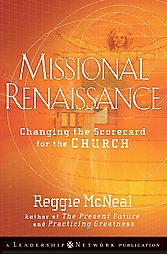Reggie McNeal: Change the Church Scorecard

Reggie McNeal’s new book, Missional Renaissance, calls for a change in what we count at church. I wrote about counting people being the church in 2007, and that’s exactly what McNeal advocates in his most recent book. A former denominational executive and now a sought-after missional church guru, McNeal challenges the “baptisms, buildings, and budgets” standards. I asked Reggie several questions about his book, and about the role of small churches in this new church scorecard. Here are his responses:
CW: In your book you call for "changing the scorecard" for the things we measure in church. Do you see any prospect for denominations changing the data they require on annual reports? If so, do you have any specific examples?RMc: I am hopeful that denominations will come around, but it usually takes a change in doing business on the front lines to force that. That lag time is very painful and will keep many denominations from enjoying the association of many new missional leaders who simply won't participate in a system that is counter-value to what they are doing. I DO have a specific example to offer as hope. In December I met with top leaders (denominational execs and pastors) of the Reformed Church in America in Grand Rapids as they convened around this very issue. The RCA is the oldest denomination in America but is willing to tackle this problem. The key is that they are committed to it, so I suspect they will get it done over the next couple of years. They will have influence over other mainline denominations at least. Perhaps even evangelical denomination leaders will pay attention once the RCA rolls it out.
CW: I write for small churches which are often not included as role models for others. Do you think that small churches can be missional and serve as legitimate missional models?
RMc: One of the things about the missional renaissance is that it makes the old pecking order based on size of attractional crowd really irrelevant to missional effectiveness. I work with congregations from weekly worship attendance of less than three dozen to churches running over 10,000. The issue is not the size of the crowd, but the impact on the community. "Small" attendance congregations have been beaten up for decades now in the old church growth scorecard. Getting out of that game can let them be winners in a missional measure. I think this is very hopeful for small congregations who really don't want to consume all the energy to "grow" but to release their congregations to be missionaries.
CW: You talk about the altruism economy. Are churches behind the rest of society in giving for the betterment of those in our society, and the society as a whole?
RMc: I really don't know the answer to this. I'm more concerned about going forward, since the altruism economy is taking off. Will churches keep up? Just this week I was eating in a restaurant. My server was a believer who belonged to a local very thriving church in one of our large cities. Her church is planning a $20 million dollar building campaign. She said, "it just doesn't seem right in these times. We should raise that money to help people." This is the sentiment that I think church leaders had better pay attention to. Otherwise we will continue to appear more interested in ourselves than the communities we are called to serve and to bear witness to.
McNeal identifies three “missional shifts” in his book:
- The shift from internal to external focus for churches.
- The shift from program development to people development.
- The shift from church-based to Kingdom-based leadership.
These shifts, of necessity, change the scorecard for church leadership, according to McNeal. Here’s how he says it in the book:
“The missional expression of the church will require new metrics to measure its vitality. The current scorecard for the North American church is tied to the definitions of church as a place and church as a vendor of religious goods and services.” Missional Renaissance, p. 37-38
And to make his point that missional is the future of the church, McNeal concludes his opening chapter with these words:
“The missional renaissance reflects the church’s response in a time of remarkable manifestation of the kingdom. Those who miss it will find themselves on the other side of a divide that renders them irrelevant to the movement of God in the world. Those who engage it will find themselves at the intersection of God’s redemptive mission and the world he loves so much he was willing to die for it.” Missional Renaissance, p. 17
If nothing else, maybe small churches will be able to model missional engagement measured by new metrics. That in itself would be a welcome shift for missional churches of all sizes.



